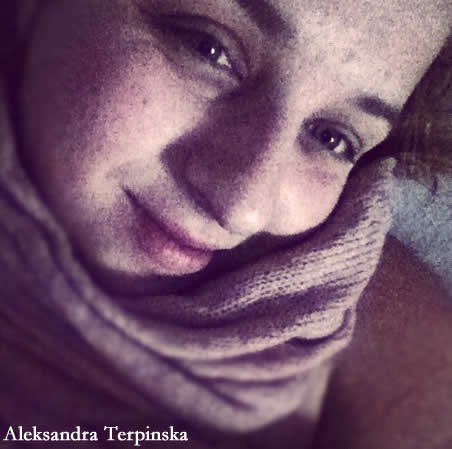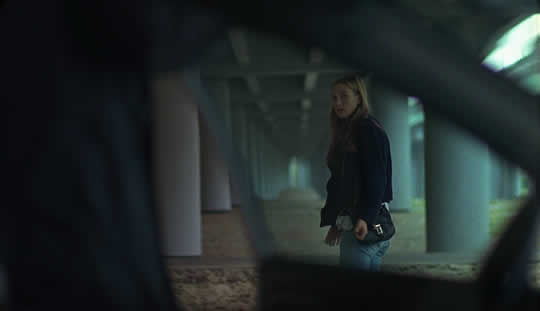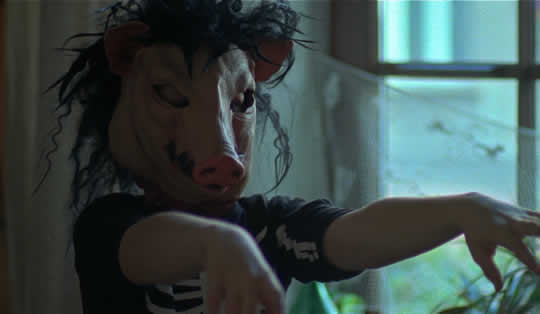 Halloween, a short film by young Polish filmmaker Aleksandra Terpinska, has received Cinema Without Borders’ award for the Best Polish Short Film at the 2012 Polish Film Festival Los Angeles
Halloween, a short film by young Polish filmmaker Aleksandra Terpinska, has received Cinema Without Borders’ award for the Best Polish Short Film at the 2012 Polish Film Festival Los Angeles
“All the short films at Polish Film Festival, LA were finely crafted and artistic films by young promising filmmakers. After a long deliberation, Cinema Without Borders’ jury picked Halloween, by Aleksandra Terpinska, as the winner of the Best Short Film Award. Halloween bring’s us the journey of a young girl embarking to find her roots and identity on Halloween night. She goes through many dark moments, but finally realizes that comfort is at home. This film captures the spirit of Halloween through the story of a sweet child in a scary costume.” said Bijan Tehrani Editor in Chief of Cinema Without Borders.
Aleksandra Terpinska, director of Halloween, graduated in psychology at Warsaw University and is now her fourth year at the Katowice Film School. She won the Screenplay Award in the Student Kodak Commercial Film Competition in 2009, and the two awards for Best Film and Best Director in 2010. Her list of short films include Jasmine, Furies, and Tonio Krüger, as well as No Mercy, a documentary about wheelchair rugby. In 2012, she was nominated for the John Machulski Prize, an award for Polish Independent Cinema for the her latest short film Halloween.
Bijan Tehrani: Could you please tell us how you came up with the idea for Halloween?
Aleksandra Terpinska: First it was a short exercise for my class. The idea was that every person in my year should write a short story about Halloween and it should happen in one house, so there is a bunch of family members in one house and I should write a short story about one family. I tried to figure out what I remembered about Halloween, and Halloween in Poland is a really important holiday. I remember that one of my friends in high school, his birthday fell on Halloween and we made a lot of fun of him because of that. I figured out that I would just tell the story from the point of view of a girl, because this was more closely related to my youth, and then I thought that it would not be a bad idea to do this as a final exercise for my school at the end of the year; so I worked on the script and tried to advance the plot. In the first version, everything that happened was in the flat, and I think it is better for the movie if you take the action away from the inside. So I wrote out the scene with the ghoul and father and so on. That is how it happened—it took me about half-a-year to write the script, and then I just made it! 
BT: Your story has different levels and layers; how were you able to balance all of these layers in the film? Was this all planned during the writing process, or did you add layers while you were shooting the film?
AT: It was all in the screenplay. I can’t imagine improvising on set, so everything was figured out before and what you see on the screen was in the script.
BT: Is Halloween your first film?
AT: Not exactly—it was a film that I made after the 3rd year of my film school. At my school after your first year, you do these exercises where your teacher gives you guidelines that you must follow for your projects; for example, “no dialogue” and so on. In your second year, you are making an adaptation of a story and on the third year, you can figure out your own screenplay. So this film is the first film that was truly mine from the end to the beginning.
BT: Congratulations to you, because the film is very professionally done and it shows that you have a promising future as a film director. How did you go about casting the film?
AT: For me, casting is one of the most important things and I observed the actors extensively, from going to the theatres and some casting, and all the time thinking about the actors. For example the girl Jasmine, the main character, I knew her beforehand and I knew that she would be good in the role. Once you have the character in mind, you just think about the actor and then consider if he/she would be good for the part. Only the young boy was casted shortly before shooting. The father and the grandma are quite well known actors in Poland, so I knew them from other productions; the grandmother is a great theatre actress and I saw one of her performances in a play and she was so strong. I did not want to show a typical granny where she is too nice and cute, but I wanted the character to be unique in the sense that she lives her life in her own way. I did not want clichés with my characters. The actors were really great on the set—because we are all learning as well, there are can be some delays and some disasters, so they showed a lot of patience with us.
 BT: Were any of the experiences of the main characters reflexive of your own life experiences?
BT: Were any of the experiences of the main characters reflexive of your own life experiences?
AT: Yes, that is kind of part of my story also. My parents are divorced, so I know the feeling very well. I also think that if you are a young filmmaker, there are still lots of things that you have to carry on the set, and it helps if you are familiar with the story that you are directing because it helps you show the emotions. I like the kinds of movies that touch the viewer, so it was important to me that I bring universal and personal issues into the film.
BT: How do you feel about coming to the Los Angeles Polish Film Festival, and also winning the Cinema Without Borders Award for Best Short Film?
AT: I really appreciate it, and I thank you for this award because we did not get many awards in Poland. The audience really liked this movie; after screening people would come to say “thank you” and people were really touched—but the festivals didn’t award the film. I am really grateful that you appreciate this movie!
BT: I have seen several short films from Poland that are very nicely done, but for some reason they were trying to be very bitter and tragic.
AT: That is what most people in Poland do; we are a very sad country, and that is the Polish style. Happy endings are not very popular and it is always more touching if you put some bad ending with a lot of drama, so it is more appealing to our audience.
BT: It’s interesting to see the culture through the filmmaking. I appreciate you taking time to connect with our audience. Congratulations for your accolades, and good luck to you!

